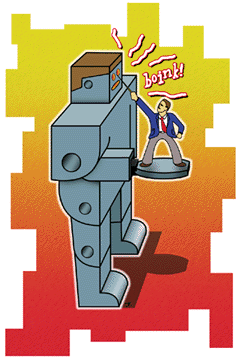
Though there’s no clear-cut answer to this question, I can tell you that dealership body shops don’t have nearly the clout that this reader thinks we do, and I can share some insight that’s helped to make my dealer body shop successful.
Insurance Climate – The first thing that comes into play here is the typical insurance climate in your geographical area. If you’re in a trade market that has a high utilization of used parts, you’ll have a difficult time negotiating for OEM. The best thing you can do here is educate the consumer and be sure you understand the policies of your customers’ insurance carrier. Some carriers do take their insured’s desires into account. Insurers, like us shop owners, are doing all they can to retain a solid customer base. Equally important is to know your state insurance department regulations regarding the use of LKQ or aftermarket parts.
The only advantage that we, as dealer body shops, have is in regard to our mechanical labor rate. Insurance companies in my market pay the posted labor rate for our mechanical department. However, if the mechanical operation is routinely done in other local body shops at the prevailing body rate, the adjuster may make this a negotiating point. But I don’t waiver on this item. If my mechanical shop does the required repair, we get paid our posted rate. (I explain how a little later in the article.) When it comes to having clout in your market, it doesn’t matter whether you’re a dealer or an independent shop. If you have a reputation for doing quality repairs, have a high customer satisfaction rate that you can document and have cycle times at industry standards, you have all the clout you need. I will say that dealer shops may be in a better position to achieve all this since most manufacturers require that these records be kept. Also, dealer shops have quicker availability to replacement parts, in most cases, which helps to reduce cycle time.
Your Competition – Know your competition. Will the shop down the road agree to LKQ parts as a back up for an adjuster while you’re attempting to write OEM? I’ve seen this happen many times from both sides of the fence – while I was adjusting claims for a major insurer, as well as when I was managing shops. When business slows down, the competition gets tougher, and John Doe’s shop will cut an estimate just enough to secure an agreed price and steal your job. And this kind of business practice hurts our entire industry, dealer and independent alike.
I believe this reader – and probably many other independents out there – makes assumptions about “dealer clout.” You can post any rate you desire for your shop or demand any parts you wish to install on a particular vehicle, but at least in New York, if an adjuster can’t reach an agreed price with your shop, he’ll send a “reservation of rights” letter to his insured explaining the reasons why and will provide a list of other local shops that are willing to repair the vehicle. The current prevailing market rate is all that an insurer’s required to pay for repairs in your area. (I’m currently in negotiations with Progressive insurance regarding this.) And my being a dealer body shop makes absolutely no difference.
In my market area, it’s unlawful for shops to “discuss” their labor rate – something to do with “collusion” or “price fixing.” Yet how many times do you receive surveys from insurance carriers asking what your shop labor rate is? Or how many times have you heard an adjuster say that he’s sorry but he can’t pay your requested rate because it’s out of line with the “prevailing” rate in your market?
At my dealership, we found a way around at least part of the labor rate question. All mechanical labor operations are performed by our service department as a sublet from the body shop. There’s a considerable difference in rates and, as a sublet, the rate has to be honored. This way, at least the dealership in general still reaps the profits instead of our competition – and I retain my body customer.

LKQ Parts vs. A/M Parts – I can only speak for my shop, though I do believe many others think the same way. There’s been quite a shake up in the A/M world lately regarding fit, crash reliability and overall quality. At my shop, my techs would much rather install a good LKQ part than an A/M one. At least they know the part will fit right the first time, saving valuable repair time.
If you have a good working relationship with a local salvage yard and your estimator and parts people properly check the parts on arrival, you can still have a successful and profitable repair. Although it’s an LKQ part, it was first an OEM part designed for the vehicle your techs are repairing. Just make sure that during the estimate procedure, you address time to prep all LKQ parts to be used. For example, if you’re sectioning a rear quarter or rail, be sure to include time to cut for proper fit, remove old undercoating, grease or oil, etc. Part of this responsibility also lies on the salvage yard. If you’re told the part is in perfect condition, make sure it really is before you accept it off of their delivery vehicle. Don’t accept it until you know it’s in the condition you were told it was in. If it isn’t, call the supplier and have the cost adjusted accordingly.
No matter what part you write for, sooner or later, you may have to use LKQ parts. I believe it’s important to know your local dismantlers and occasionally tour their yards. Insurers would have you use an Internet or fax-based salvage operation that may be hundreds of miles away. By the time these parts show up, they may not be in the “pristine” condition the adjuster said they were in. And I don’t need to tell you what happens to your cycle time and customer satisfaction when you have to re-order these parts.
The reader mentioned that dealer “mechanical shops don’t work with junkyard or jip parts. Why agree to do anything different in the body shop?” While LKQ parts are used in dealer mechanical shops, it’s true that it’s very rare. And this is because most of the items addressed in these situations are safety items such as steering and suspension components. Insurers won’t require the use of LKQ in these cases due to the liability exposure. Insurers not writing for A/M mechanical parts has nothing to do with our being a dealership body shop.
Everything I spoke of in this article boils down to two things. Education and negotiation. While attending a training session at Tech-Cor in Chicago, the most important issue stressed was the power of strong, educated negotiating. When it comes to getting what you need out of an estimate and to restore your customer’s vehicle to pre-accident condition, an educated estimator with the proper negotiating skills will always succeed.
Are there any advantages to being a dealer body shop? Sure. One of the main advantages is, for us anyway, parts availability. We pick up at a Ford depot daily, and this greatly enhances my cycle time. Also, if a bolt-on part is on back order, I have an entire lot of new parts to choose from.
I also think that dealer shops are able to keep up with technology changes in the industry better than independents because we have a “leg up.” We’re privy to new updates as soon as they’re introduced to the vehicle line so, in these instances, we’re able to negotiate a better position for the industry.
I think some independent shop owners – like the reader who posed this question – think that if dealer body shops stood their ground that they could help to improve the industry. But the same could be said about independents. If they stood their ground as independents, they could help to improve the industry. The key is this: We need to stand our ground – as an industry. Neither dealership body shops nor independent body shops can do it alone.
Writer David M. Rowe is the body shop manager at Johnson Ford Inc. in Kingston, N.Y.













